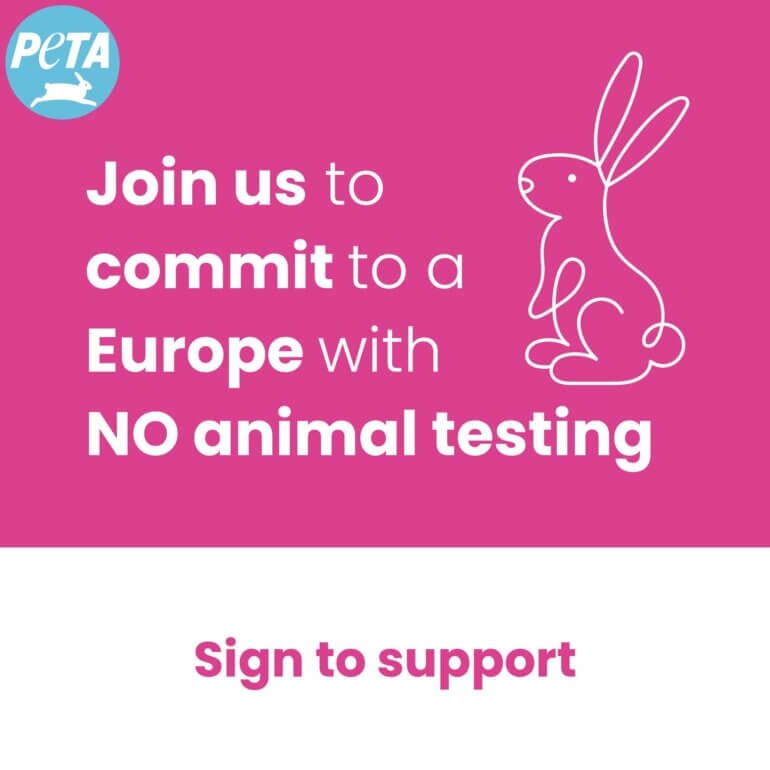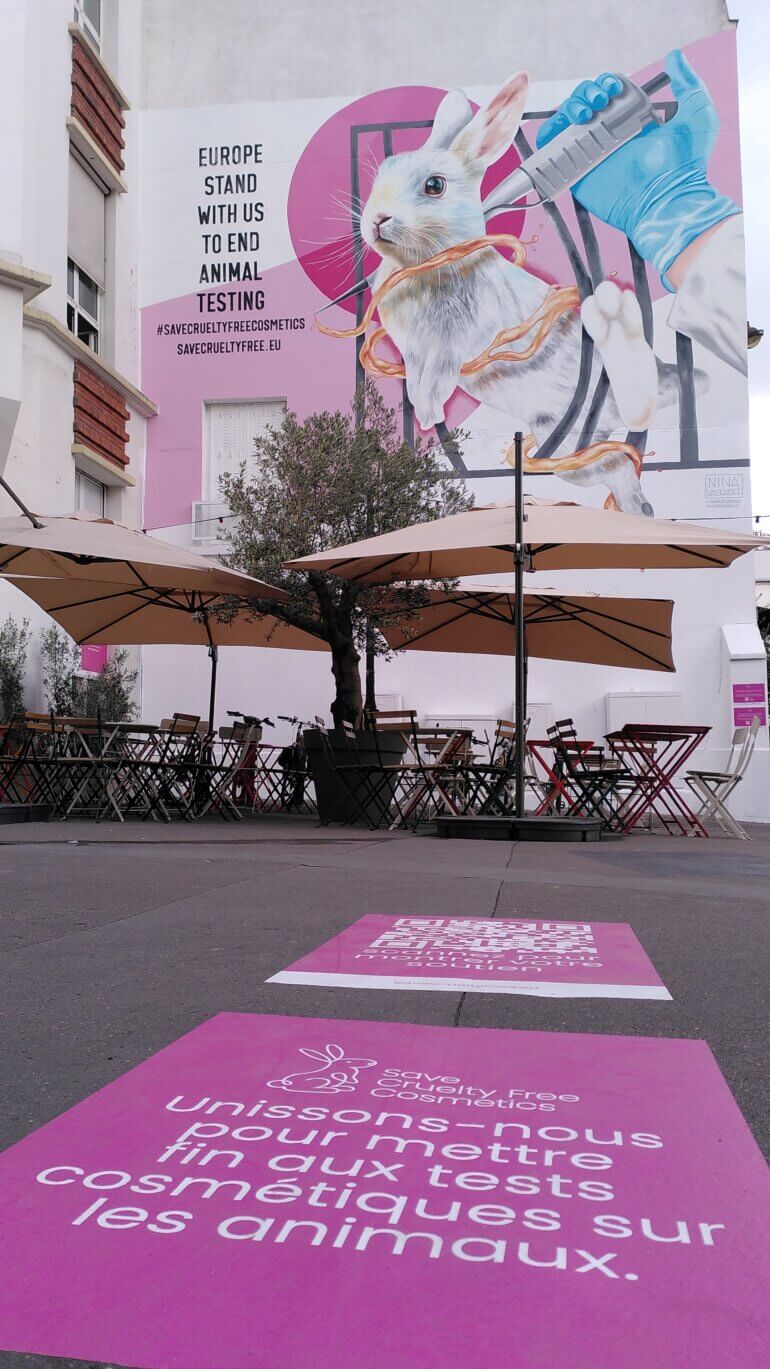About the Campaign
Dove and The Body Shop have joined PETA, Cruelty Free Europe, and Humane Society International Europe (HSI Europe) as well as Eurogroup for Animals and the European Coalition to End Animal Experiments (ECEAE), who represent more than 100 member organisations from 27 EU member states, in an urgent move to mobilise 1 million European citizens to defend cruelty-free cosmetics in Europe in the face of threats to its longstanding ban on animal testing for cosmetics.
In 2004, after decades of campaigning by consumers, animal protection organisations, and several companies, the EU banned the testing of cosmetics products on animals. In 2009, it prohibited tests for cosmetics ingredients and, finally, in 2013 it prohibited the sale of cosmetics that had been tested on animals. The EU’s approach became the blueprint for regulatory change in countries around the world.
Yet, recent test requirements from ECHA effectively destroy the bans and threaten the additional progress the European Parliament has been boldly calling for since 2018 – a global ban on all animal testing for cosmetics by 2023.
The Body Shop has been campaigning relentlessly against the practice of animal testing for cosmetics since 1989, helping to lead the charge that resulted in the current ban in Europe. Dove has spent 15 years working to change the beauty industry for the better through its “Campaign for Real Beauty” and the Dove Self-Esteem Project. Proudly certified by PETA US as animal test–free, Dove has supported bans to end animal testing globally, working alongside lawmakers, animal protection organisations, and like-minded companies to achieve this goal.
The two beauty brands have come together to galvanise consumers to take action to save Europe’s ban on animal testing by signing an ECI – a mechanism by which EU citizens can help shape the EU by calling on the European Commission to propose new laws.
ECHA is proposing new animal testing on ingredients that are known to be safe.
ECHA is calling for new animal testing on ingredients that have been safely used by consumers and handled safely in factories for many years. If its policy is upheld, thousands more animals could be subjected to cruel tests – even on ingredients used solely for cosmetics – when there are other ways to generate safety data.
The time to act is now.
Animal testing is no longer necessary to ensure safety, thanks to modern, human-relevant, non-animal methods that safety scientists have been developing and using for decades.
Speaking with a united voice to end animal testing for beauty products, PETA, The Body Shop, Dove, and animal protection organisations are calling on consumers to sign the Save Cruelty-Free Cosmetics ECI, demanding that the European Commission do the following:
1. Protect and strengthen the cosmetics animal testing ban
The Commission must initiate legislative change to achieve consumer, worker, and environmental protection for all cosmetics ingredients without new tests on animals for any purpose at any time.
2. Transform EU chemicals regulation
The Commission should ensure human health and the environment are protected by managing chemicals without the addition of new animal testing requirements.
3. Modernise regulatory science in the EU
The Commission must commit, before the end of its current term of office, to a legislative proposal plotting a road map to phase out all animal testing in the EU.
Together, we aim to get to 1 million signatures in the fastest time ever for an ECI – sending a clear message that ECHA’s demands for new testing go against the policy of animal testing as a last resort and against the wishes of EU citizens.
But we can’t do it alone.
European citizens can sign the ECI and tell the European Commission they won’t accept broken promises from Europe or regulations that mean animals suffer and die for cosmetics.

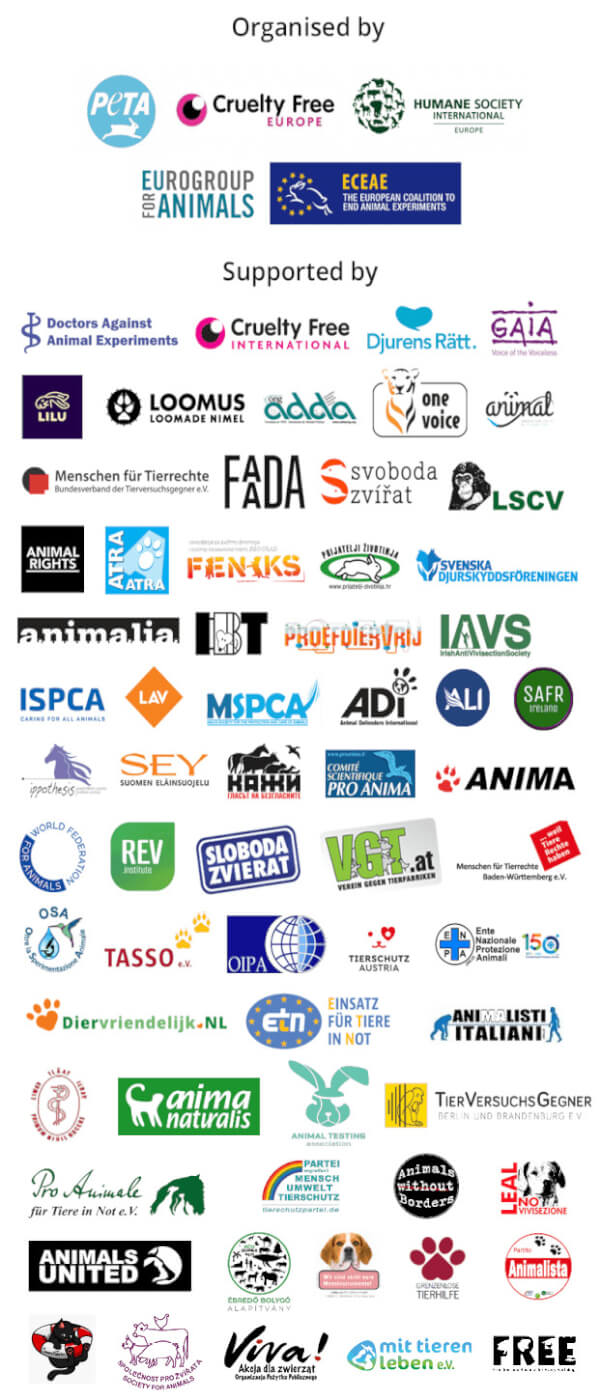
Latest Updates
We Did It! European Citizens’ Initiative Validated With 1.2 Million Signatures
A whopping 1.2 million signatures have been validated and submitted for the “Save Cruelty Free Cosmetics” European citizens’ initiative – smashing the requirement of 1 million valid signatures.
History in the Making! European Citizens’ Initiative Closes With 1,413,383 Signatures
PETA Celebrates 35 Years of ‘Don’t Kill the Animals’ by Calling For an End to Animal Testing
To the tune of Lene Lovich and Nina Hagen’s song, dancing “animals” call on EU citizens urgently to sign the initiative against cruel experiments.
1 Million and Counting: Act Now to Help Animals in EU Laboratories
A massive 1 million EU citizens have now signed the initiative calling for an end to animal testing – but there is still work to do to ensure the success of this groundbreaking movement.
Watch Italian Celebrities’ Horrified Reaction to Animal Testing
In a new video, PETA caught the shocked reaction of Italian celebrities, who were horrified to learn what’s happening to animals in EU laboratories.
Shocking Statistics Reveal 10.5 Million Animals Suffering in EU Laboratories
More than 10.5 million animals were used in experiments in European laboratories in 2019, newly released statistics reveal. We must take action.
‘Turn It Off!’ Celebs React to Shocking Animal Testing Video
Watch Victoria Smurfit, Greg O’Shea, and other Irish celebrities’ horrified reaction to animal testing footage in a new PETA campaign video.
‘Don’t Kill the Animals’ Blasts as Protesters Dance to Stop Animal Experiments
Dancing to “Don’t Kill the Animals”, PETA protesters in animal costumes descended on the European Parliament in Brussels, calling on the EU to phase out animal testing.
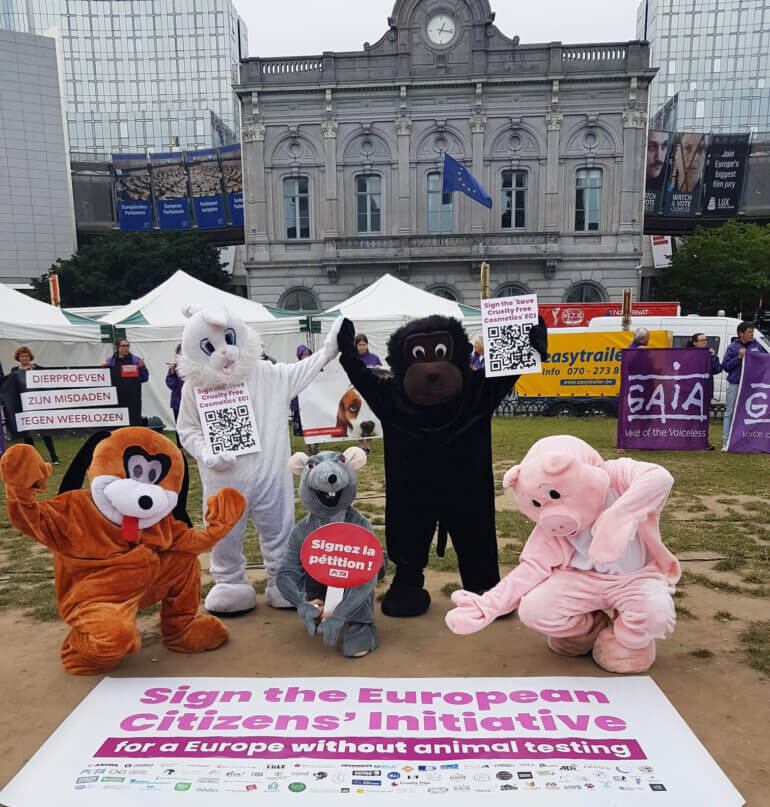
Pregnant Animals and Their Unborn Offspring Are Killed in EU Laboratories – Take Action!
It’s the 21st century, yet EU laws still require thousands of animals to be poisoned and killed in unreliable, archaic chemicals tests. Here’s how you can help stop this.
Paul McCartney Says ‘Come Together’ and Uphold Animal Testing Ban – Will You Join Him?
We need 1 million EU citizens to take action for animals in laboratories. Will you help?
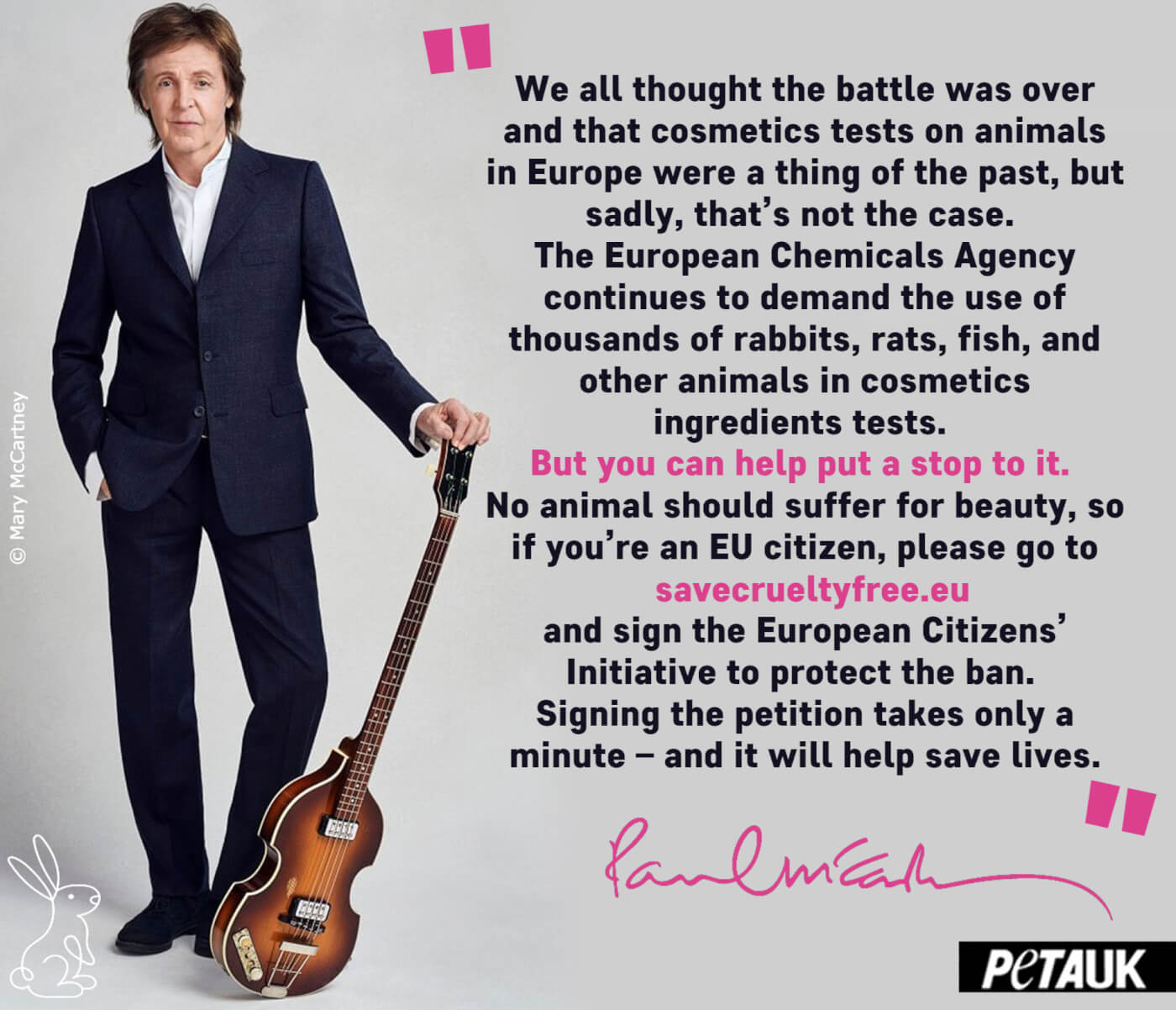
5 Animals Tested On in EU Laboratories
Learn more about animals tested on in EU laboratories – you might be surprised by what you find out.
Supportive MEPs joined the urgent call to Save Cruelty-Free Cosmetics today in Brussels
MEPs joined in to showcase the political support behind the Save Cruelty-Free Cosmetics ECI.
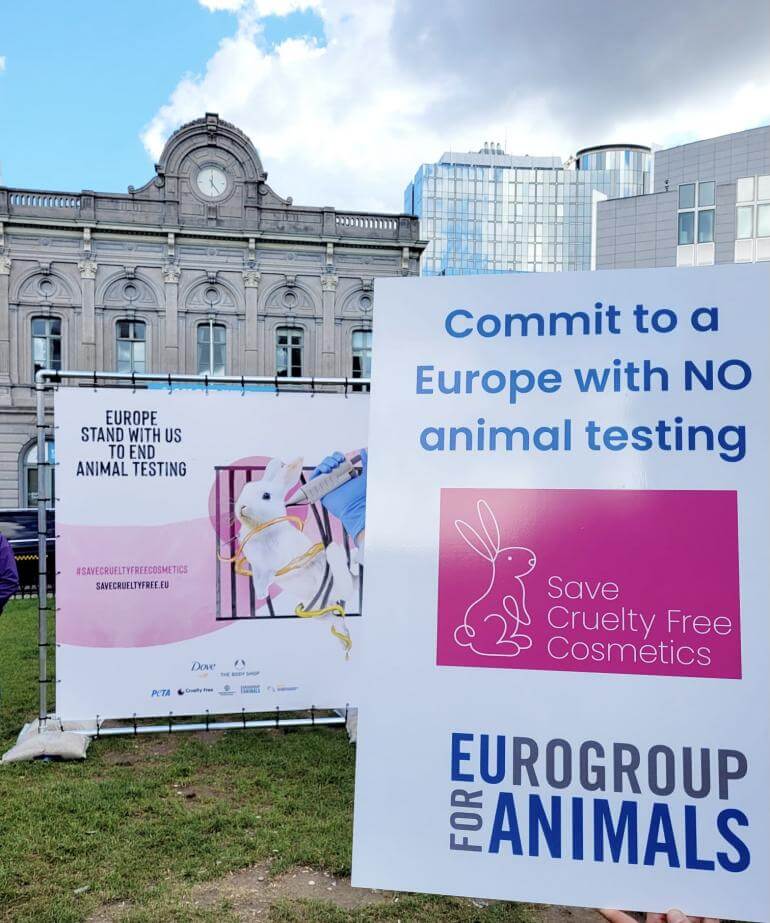
Dove and The Body Shop Join PETA in Calling On the EU to Save Cruelty-Free Cosmetics.
Together, we aim to get to 1 million signatures in the fastest time ever for a European Citizens’ Initiative. Will you join us?
Frequently Asked Questions
I’m a UK national – can I sign?
The UK is no longer a member of the European Union, so UK nationals are not able to sign the ECI. However, the more voices raised, the better – wherever they are. Remember, EU nationals can sign the ECI irrespective of where they live – that includes those living in the UK. UK nationals can help by encouraging them and any European friends and family to sign.
If you aren’t an EU national, please invite your friends who are from the EU to sign:
Sharing our content may mean you also share your personal data with the chosen social media platform. Find out more here.
Aren’t cosmetics tests on animals already banned in the EU?
Tests on animals for cosmetics products and their ingredients have been banned in the EU since 2009, and a ban on the sale within the EU of animal-tested cosmetics products and ingredients was fully implemented in March 2013. These bans – contained within the EU Cosmetics Regulation – were designed to ensure that animals do not suffer for the purpose of developing or marketing cosmetics and their ingredients and that the safety of these products is assured by science that doesn’t involve animal testing.
Despite the bans, ECHA, supported by the European Commission and the ECHA Board of Appeal, continues to demand new tests on animals for chemicals used as cosmetics ingredients under the Registration, Evaluation, Authorisation and Restriction of Chemicals (REACH) Regulation. This policy – which it now applies even to chemicals used exclusively in cosmetics – erodes the bans and goes against the intention of legislators in creating them: that animals no longer suffer and die for the sake of cosmetics.
ECHA, the European Commission, and the ECHA Board of Appeal argue that the animal tests are needed to protect workers and our environment because the EU Cosmetics Regulation only covers consumer safety. This position places an artificial divide between consumers and workers, disregards a long history of safe use for many of these ingredients, violates the legal requirement to use non-animal methods instead of tests on animals wherever possible, and forces cosmetics regulators to disregard the animal test results to avoid triggering the bans.
What is a European Citizens’ Initiative (ECI), and how will it help the situation?
An ECI is a mechanism by which European nationals can call on the European Commission to propose new legislation on a given issue. For an initiative to be considered by the European Commission, it needs to get the support of at least 1 million EU citizens in the form of signatures. Unlike a petition, an ECI addresses the European Commission directly and can result in changes to EU law.
This ECI calls on the European Commission to protect and strengthen the cosmetics animal testing ban by ensuring only non-animal methods are used to assess the safety of cosmetic products and their ingredients for consumers, workers, and the environment. It additionally calls on the European Commission to transform wider EU chemicals regulation by ensuring that all chemicals are managed without the addition of new animal testing requirements and to modernise science in the EU by committing to a legislative proposal that plots a road map to phase out all animal testing in the EU.
By promoting the transition to animal-free, human-relevant research and testing in the EU, this ECI has the potential to spare millions of animals suffering and death each year and improve protection of human health and the environment.
Why is now the right time for an ECI?
The EU’s groundbreaking cosmetics animal testing bans – which were a victory for animal protection borne of decades of campaigning – are under threat. The stance taken by ECHA and the European Commission that even chemicals used exclusively as cosmetics ingredients be subject to tests on animals under REACH completely undermines the ban and goes directly against its purpose and public expectation: to ensure that animals no longer suffer and die for the sake of cosmetics.
In August 2020, the ECHA Board of Appeal adopted two decisions that instructed a company to carry out tests on animals for ingredients used exclusively in cosmetics. This position was supported by the European Commission. Unless the Court of Justice of the European Union rules against these decisions (cases are pending), the cosmetics testing bans will be rendered meaningless and it will become all but impossible for cosmetics companies – including cruelty-free brands – to market products without an ingredient that has been, could be, or will be tested on animals under REACH. We need to act urgently to make sure that the European Commission and ECHA’s interpretation of the cosmetics animal testing bans is challenged and that through this ECI, they hear loud and clear how much we all, as Europeans, value cruelty-free cosmetics.
To make matters worse, the European Commission’s recently published Chemicals Strategy for Sustainability – which presents a new long-term vision for the EU’s chemical policy – could lead to a massive increase in animal testing requirements. Continued reliance on animal tests will not achieve the EU’s goal of a “toxic-free environment”, and these changes could further erode the cosmetics animal testing bans and result in yet more tests on animals for existing cosmetics ingredients as well as new ingredients.
We need to act now to protect and strengthen the cosmetics animal testing bans, to prevent the introduction of new animal testing requirements for all chemicals, and to set in motion the phasing out of all animal testing in the EU – mobilising Europe’s citizens to sign an ECI is key to doing this.
How was the campaign created?
PETA and our affiliates have been campaigning against the threats to the EU’s cosmetics animal testing bans for some time. We have also been working together with other animal protection organisations in Europe – and with cruelty-free brands – to ensure that the bans are properly interpreted and implemented as legislators intended and as Europe’s citizens demand.
In December 2020, we joined other animal protection groups and over 450 brands to send a joint letter to the leaders of the EU’s main institutions and a press release to news outlets across Europe. All of these efforts have sadly so far been met with the same intransigence.
We needed to do more to ensure that Europe’s decision-makers hear the voices of citizens. So, PETA, Cruelty Free Europe, Eurogroup for Animals, the ECEAE, and HSI Europe agreed that an ECI would be a strong way forward. The groups also invited two long-standing and active partners vocal in challenging the impact of REACH on cruelty-free products, The Body Shop and Dove, to support the campaign. We’re asking anyone who cares about a Europe without animal testing to do whatever they can to make this a successful ECI.
What happens if the ECI fails?
We’re putting everything we can into this ECI, and we know that the people of Europe care. Polling conducted in 2020 by Savanta ComRes showed that three-quarters (74%) of adults in EU member states agree that animal testing for cosmetic products and their ingredients is unacceptable in all circumstances. In addition, nearly three-quarters (72%) agree that the EU should set binding targets and deadlines to phase out testing on animals and 70% agree that enabling the full replacement of all forms of animal testing with non-animal testing methods should be a priority for the EU. We are confident that we can do this and that the voice of EU citizens must be heard loud and clear. That’s why we are all working together, along with our members across the EU as well as cruelty-free brands.
We recognise that reaching the required number of verified signatures won’t be easy, especially against the backdrop of ongoing COVID-19 restrictions in many areas. Getting the European Commission to implement the changes we are asking for won’t be easy, either. However, we have to give this our best shot. We’re in this for the long haul and won’t give up until the EU is truly cruelty-free. We’ll continue to use other routes like lobbying and, if necessary, legal challenges, too.
How do the recent ECHA Board of Appeal decisions affect cruelty-free cosmetics?
The erosion of the cosmetics animal testing bans is now so extensive that it is becoming increasingly harder for companies to make commercial products without using ingredients – including existing ingredients with a long history of safe use in cosmetics – that have been or could be subject to new tests on animals under REACH.
As well as signing the ECI, use cruelty-free products, and when in doubt, check the PETA US international database of companies that do and don’t test on animals.
As European citizens, you are critical to the success of this ECI and, in turn, to ensuring that cosmetics ingredients are no longer subject to animal tests under REACH or any other legislation, that new chemicals laws will not mean yet more animal suffering, and that the European Union puts in place a concrete and concerted action plan to phase out all animal experiments.
Which cosmetics ingredients are subject to new tests on animals under REACH?
The August 2020 ECHA Board of Appeal decision concerned two ingredients commonly used in sunscreens, but the problem is much wider than that: the new ECHA requests for animal tests affect commonly used surfactants and preservatives. Some well-known ingredients subject to new tests on animals under REACH include propylparaben, sodium lauroyl sarcosinate, and silica, and many more ingredients used in cosmetics will be introduced if we aren’t successful. These tests involve the suffering and death of many thousands of rabbits, rats, and other animals.
In addition to the ethical concerns relating to the suffering of animals, there are also significant concerns about the translatability and predictiveness of animal tests – meaning the effects of these ingredients on animals are not a reliable indicator of human reactions. Setting out an ambitious strategy for phasing out the use of animals in research and testing will stimulate greater activity in the development of non-animal methods. For example, we saw massive investment by cosmetic companies in non-animal methods following the EU bans. As a result, many new non-animal technologies and methods have been developed and are now being used around the world to ensure consumer safety and assess the risks of cosmetic ingredients and other chemicals. We believe that there are strong scientific, ethical, and economic arguments for ending the use of animals in the EU in favour of modern, human-relevant approaches.
Is it possible for cosmetics to be safe without testing on animals?
Yes. Safe cosmetics without testing on animals isn’t a new idea – many companies have been cruelty-free for decades.
In fact, cosmetics can be safer without animal testing. Toxicity tests on animals work on the premise that the effect of a product or ingredient on animals can provide information that can predict what will happen in humans or in the environment, but there are significant and growing concerns that this is not the case.
Many tests on animals required by law have not even been formally validated, meaning that their scientific basis, reliability, and relevance to humans have not been satisfactorily demonstrated. Even those tests that have been validated can be unreliable, failing to produce the same result when the test is repeated.
When you consider the biological differences between humans and the animals commonly used in toxicity tests, the excessive doses that they are exposed to, and the unnatural and stressful conditions they are forced to endure in the laboratory, it’s no surprise that results from human-relevant alternatives can better protect people.
The cosmetics animal testing and sales bans brought about a boom in the development of non-animal methods for assessing the safety of cosmetics and their ingredients. Superior approaches incorporating the use of cutting-edge tools like three-dimensional tissue models and advanced computer simulations are now used routinely to ensure the safety of cosmetics without harming animals.
It’s also important to note that many of the cosmetics ingredients subject to new animal testing requests under REACH have a long history of safe use in humans.
In the rare event that the safety of a cosmetics product or ingredient cannot be demonstrated using non-animal methods, it should simply not be used.
What is the Chemicals Strategy for Sustainability, and what implications does it have for animal testing?
With its new Chemicals Strategy for Sustainability (CSS), the EU and its member states are seeking to support innovation to design safer products, restrict toxic chemicals, and limit exposure to chemicals that are harmful to human health. Sadly, the European Commission and ECHA’s current approach to new chemicals laws could condemn millions more animals to suffer in cruel experiments. And while we support the aims of the strategy, more animal testing will not help to protect human or environmental health.
Our ECI calls on the European Commission to transform chemicals regulation so that it ensures the protection of human health and the environment by managing chemicals without new animal testing requirements.
This means that the EU should use modern techniques to ensure an efficient, human-relevant, and cost-effective approach to assessing and managing the potential toxicity of chemicals. Better protection can be achieved by applying new science to more effectively and efficiently understand and regulate the potential of chemicals to cause harm. The CSS should be an opportunity to future-proof regulations, enabling rapid adaptation to technical progress and the immediate adoption of existing and emerging animal-free technologies. There is also a need for urgent investment in next-generation, animal-free approaches that will also improve our ability to characterise and regulate chemicals.
How can the EU practically phase out animal experimentation?
Eleven years since the adoption of Directive 2010/63/EU on the protection of animals used for scientific purposes, which raised hopes that scientific research in the European Union would make the transition towards non-animal methods, official statistics demonstrate that progress towards this goal is extremely slow. The number of experiments on animals has remained relatively stagnant – from 11.4 million in 2015 to 11.2 million in 2016, 10.9 million in 2017, and 10.6 million in 2018. (The inclusion of Norway in these figures for the first time elevated that number to 12.3 million.)
The rapid emergence of advanced non-animal models – such as organs-on-a-chip, pathway-based approaches, and computer models – today offers the potential for increasing momentum and optimism towards the replacement of animals in research and testing. The EU’s own Joint Research Centre has produced key reports and undertaken activities to promote the use of non-animal models and methods in a range of research areas, but much more needs to be done by everyone involved. The EU still does not have a comprehensive policy programme to coordinate and drive the phase out and replacement of animal experiments, encompassing the objectives of existing EU legislation and funding instruments. We believe that it urgently needs an action plan to turn the stated ambition of replacing animals in scientific procedures into reality. As animal protection groups, we provide a voice for animals and want to see animal suffering end as soon as possible. We need to build on the EU’s stated ultimate goal to replace all animal experiments and make sure that we can unite all stakeholders behind more and urgent action. Putting in place a strategic, ambitious action plan with specific milestones will be a huge step forward.
What criteria do I have to meet to be eligible to sign the ECI?
To be eligible to sign the ECI, you must be an EU national and old enough to vote in European Parliament elections. The rules on age and ID requirements vary from country to country, so check the information for each EU member state here (see the section on Giving Support).
If you don’t qualify to sign the ECI, you can still help by sharing it with family and friends and on social media.
Why do I need to provide personal data when signing?
For an ECI to be considered by the European Commission, it must get the support of at least 1 million EU citizens in the form of verified signatures. Verification is based on the personal data you provide and requirements vary from country to country. Please be assured that all data is processed in accordance with the rules of the General Data Protection Regulation. You can find more information here about the processing and protection of your personal data.
What difference will my signature make?
Your signature really can make a difference in helping us reach a million verified statements of support. This ECI presents an opportunity to help end the suffering of millions of animals currently used in experiments in the EU. We can’t do it without your help.
